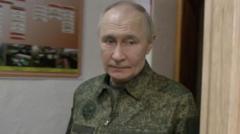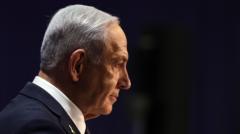In a dramatic display of political tensions, Georgia is experiencing a wave of protests following the government’s decision to suspend discussions on EU membership, leading to significant public resignations and a rejection of opposition claims by the country's Prime Minister, Irakli Kobakhidze.
Georgia's Political Turmoil: Protests and Government Resilience Amid Resignations

Georgia's Political Turmoil: Protests and Government Resilience Amid Resignations
Massive demonstrations unfold in Georgia as Prime Minister rejects calls for new elections and addresses public unrest.
The Georgian government is facing intensified demonstrations as citizens react to the ruling party's recent announcement to halt discussions on European Union accession. Prime Minister Irakli Kobakhidze has dismissed claims of misconduct, attributing the unrest to opposition misinformation. This dissent has resulted in the resignation of several key officials, including the ambassador to the U.S., David Zalkaliani, due to mounting pressure.
Protest activities have been persistent over the past few nights, reflecting the public's discontent with the government's perceived drift away from European integration and potential alignment with Russian interests. Authorities have faced accusations of excessive force against reporters covering the events, with numerous journalists attacked during the protests.
Despite these troubling developments, Kobakhidze has insisted that the government remains focused on its European aspirations, seeking to distance the Georgian Dream party from claims of democratic regression. As civil unrest persists, key figures, including the pro-Western President Salome Zourabichvili, have emerged as symbolic leaders for the protest movement, advocating for transparent elections.
The ongoing crisis has raised concerns over Georgia's strategic partnerships with the EU and the U.S., both of which have expressed discontent with the government's actions. The EU's foreign policy chief has warned of potential repercussions, while the U.S. has suspended its strategic partnership. Amidst these tensions, further protests loom as citizens voice their aspirations for a future free from external influence.
Georgia stands at a crossroads, grappling with internal strife and external pressures as it strives to define its democratic path and international alliances in an increasingly polarized environment.
Protest activities have been persistent over the past few nights, reflecting the public's discontent with the government's perceived drift away from European integration and potential alignment with Russian interests. Authorities have faced accusations of excessive force against reporters covering the events, with numerous journalists attacked during the protests.
Despite these troubling developments, Kobakhidze has insisted that the government remains focused on its European aspirations, seeking to distance the Georgian Dream party from claims of democratic regression. As civil unrest persists, key figures, including the pro-Western President Salome Zourabichvili, have emerged as symbolic leaders for the protest movement, advocating for transparent elections.
The ongoing crisis has raised concerns over Georgia's strategic partnerships with the EU and the U.S., both of which have expressed discontent with the government's actions. The EU's foreign policy chief has warned of potential repercussions, while the U.S. has suspended its strategic partnership. Amidst these tensions, further protests loom as citizens voice their aspirations for a future free from external influence.
Georgia stands at a crossroads, grappling with internal strife and external pressures as it strives to define its democratic path and international alliances in an increasingly polarized environment.





















